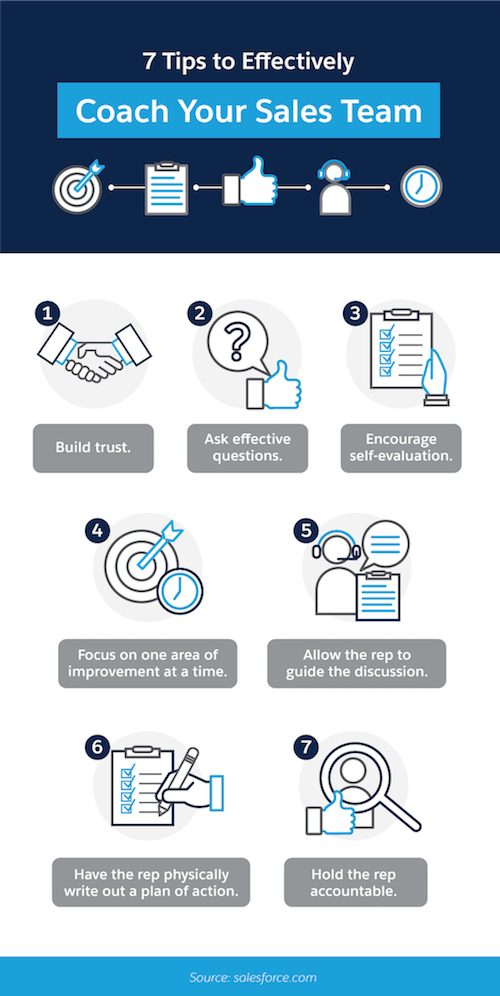As a sales manager, your job is to provide your salespeople with the tools, information, and support they need to close deals and grow revenue. You also want to help your reps develop meaningful careers. They can’t do it alone — and neither can you.
If you’ve recently been promoted to a sales manager role — or are looking to brush up on your leadership skills to earn that next promotion — consider these five essential sales management skills to help you create a successful sales team. By honing these skills, your team will better understand how to build strong customer relationships and close deals. Every sales manager needs to be able to:
- Hire and retain the right sales team
- Focus on performance management
- Learn how to coach effectively
- Know their numbers
- Rethink their approach to leadership
Additionally, mastering communication skills is crucial for building strong customer relationships, leading sales teams effectively, and conveying information across various business scenarios.

Click image to view in a new browser window
1. Hire and retain the right sales team understanding sales manager responsibilities
Good to Great author Jim Collins wrote, “The most important decisions that business people make are not what decisions, but who decisions.” For sales managers, recruiting a successful sales manager may well be the most important thing you do. And yet, since most sales managers don’t hire on a daily or weekly basis, it can be challenging to create an effective sales hiring process.
The best salespeople can earn your company big money, but they can be hard to find — and even harder to keep. One study found that the average turnover rate for sales positions is 39 per cent. In a world where four out of every 10 new hires won’t stay with your company, hiring isn’t just about snagging the best salespeople, but retaining them, too.
After all, a great sales manager at your business likely invests thousands of dollars for each new recruit. You pay to train them, and then wait for them to learn enough to start making valuable sales. No sales manager wants to put in the time and effort just to start the process all over again.
That’s why successful sales managers must try to hire the right people from the start. Here are some tips to get going:
- Create an ideal candidate profile before you hire. Building your team goes best when you know what you want the end results to be before you even begin. Outline the skills, experience profiles, and characteristics that will fit best with your team, now and into the future. Organise your job description around these characteristics, and screen for them as you interview. Specifically, crafting a detailed sales manager job description that outlines responsibilities and qualifications is crucial. This helps in attracting and retaining skilled sales reps by ensuring they understand their role in overseeing the sales team, setting objectives, and driving revenue growth.
- Remember that degrees and experience are only part of the equation. Expand your evaluation beyond the resume to screen for more elusive soft skills, like executive communication and relationship-building abilities, as well as sales skills, like logical analysis and the ability to learn a new business.
- Highlight your business as a desirable employer. When a great candidate is sitting in front of you, often the evaluation is going both ways. That’s your cue to sing the praises of your employer and to dig into anything the candidate wants to know. Share information about benefits, company culture, and opportunities for growth. Seek to understand what motivates these candidates, speak to their passions and their dreams, and tell them why you’ll help them do the best work of their careers.
- Go beyond the job boards. Your next top salesperson is probably busy closing deals, not scouring job boards. So open other avenues in parallel, like recruiter channels, events, and word-of-mouth referrals. Critically, increasing diversity in your sourcing will also increase diversity in your team. Check out more tips to diversify your candidate pool.
When people do move on from your team, another important sales manager skill is the ability to perform an empathetic exit interview. These meetings with sales teams will help you understand why they are leaving, how satisfied they were, and what you can do better.
2. Focus on performance management
As a sales manager, sales performance and management is at the heart of your job. Sales managers are responsible for supporting their salespeople with goals, coaching, and resources while maintaining an authentic interest in their personal growth. Performance management is what makes this growth happen. Developing and implementing effective sales strategies is crucial to achieving sales performance and management goals.
Berkeley experts recommend taking a three-pronged approach to performance management:
- Plan: Collaborate with your salespeople to create expectations around performance and tailor individual growth goals to their strengths and business objectives. Outline these goals in a plan together with specific areas for improvement, actionable steps for achieving desired results, and a timeline for when it all should happen.
- Check-in: Schedule performance conversations where you and your salespeople discuss what steps have been taken and how performance has been affected.
- Review: Following the timeline, review performance against the plan, and talk about factors that may have affected the results. Discuss what went well and what didn’t, and create new objectives for the next performance management cycle.
Employees crave ongoing feedback, so don’t wait for official reviews before you discuss performance. Instead, build trust-based relationships with your team that provide solid ground for meaningful and regular check-ins throughout the year. Make sure coaching plans include regular training on digital sales tools, too.
Performance conversations with sales leaders are a crucial area where employee experience and business results overlap. Like all employees, salespeople want to have good relationships with their managers and seek opportunities for development. Listen carefully to what they have to say; these are dialogues, not monologues.
Performance management is what you’re doing. Coaching effectively is how you do it. See the next section for more details on that.
3. Learn how to coach effectively
Effective salespeople aren’t born. They’re created through experience, intensive training, and effective sales coaching, often from great sales managers, who make it a point to help their team members succeed.
Sales training traditionally focuses on sales methodologies and product knowledge. In contrast, and just as important, sales coaching is encouraging behaviours that drive long-term success among your sales team members themselves.
To be successful as a sales manager, evaluate each member of your sales leadership team as an individual and determine how coaching can help them grow as a salesperson. Get started with these seven steps:
- Build trust. No rep will take your advice unless they trust you. Don’t offer hot takes on their performance right out of the gate. Take time to observe how they work holistically before offering ideas for improvement.
- Ask effective questions. Why do they approach their work the way they do? What motivates them? These questions will help you understand their motivation for better results.
- Encourage self-evaluation. Making suggestions as their manager is great, but what’s even better is helping reps cultivate their own self-awareness. That way they can see issues and resolve them independently.
- Focus on one area of improvement at a time. No one wants to hear that they need to improve in 10 areas. Start small.
- Listen as much as you speak. The rep should co-lead any performance discussions alongside you. If you find yourself talking much more than the rep, that could mean you’re not listening enough.
- Develop a plan of action with your rep. Share, don’t mandate, the roadmap to better performance.
- Hold the rep accountable. Ask about their progress monthly or more frequently, depending on the relationship and coaching needs.
Once you better understand each person’s needs and potential, you’ll be better suited to create a dynamic coaching plan designed for their individual strengths and weaknesses.

Click image to view in a new browser window
4. Know the numbers
As a sales manager, numbers will be your new best friend. Which numbers? Analytics on how the business is performing. This data will illuminate areas that need extra sales attention so you can pass down advice to reps.
If you’re a newly promoted sales manager, think about this as the shift from flawless sales execution to being a numbers-driven coach. Consider these two key areas for revenue growth and focus:
- Look for the story behind the numbers: Financial reports often don’t provide context for numbers. For example, how does a 25 per cent increase in sales impact quarterly earnings? If one region suddenly saw a dramatic surge in sales, did they also invest significantly in new hires a quarter before? Knowing the data won’t help you if you don’t know what the numbers truly mean. Analysing these numbers can help in refining your sales strategy, enabling you to better meet sales targets and improve overall sales performance by planning and implementing effective strategies and overseeing sales teams more efficiently.
- Expand outside of sales: Look beyond sales-specific numbers. How is marketing performing? What about customer service? Knowledge of company performance across the full customer lifecycle will give you a better understanding of where sales fits in. Then you can better guide your team.
5. Rethink your approach to leadership
Some managers confuse leadership with power. Being an effective sales team leader means understanding your true role as a leader. Sometimes a leader isn’t the loudest person in the room. Sometimes being a leader means active listening, or pitching in on some not-so-glamorous duties if a team member is unexpectedly away.
As a good sales manager does, your true purpose is to empower your team and provide them with the tools and resources they need to succeed. This means ensuring they understand where their strengths lie and helping them improve areas of weakness. Your sales manager skills will get better the longer you do the job. It’s a multifaceted role, and when it’s done well, everyone benefits.
Next steps
Getting promoted is exciting. Just when you feel like you’ve mastered your domain, you rise to a new place, a beginner once again. Only now you have more responsibility than ever.
The call of the sales manager is to become a leader. Instead of solely focusing on making sales, your sales management role has expanded to support and lead those who are making the majority of the sales.
The sales manager skills list in this article will help you help your team become top performers. It won’t happen overnight: Take the time to study, adapt, and adjust your approach as you learn more about what works for you, your team members, your sales manager responsibilities and your company.
For more insight on sales targets and what it takes to boost sales productivity on your team, download our guide.


















![If you want to see your business grow and flourish, you must develop an effective pricing strategy that's appropriate for your goals. [Studio Science]](https://www.salesforce.com/au/blog/wp-content/uploads/sites/4/2024/03/Pricing-Strategy-Examples.webp?w=128&h=96&crop=1&quality=75)



![Sales support handles the essential functions that allow sales reps to focus on what they do best — sell. [Adobe]](https://www.salesforce.com/au/blog/wp-content/uploads/sites/4/2024/02/Sales-Support.webp?w=128&h=96&crop=1&quality=75)


